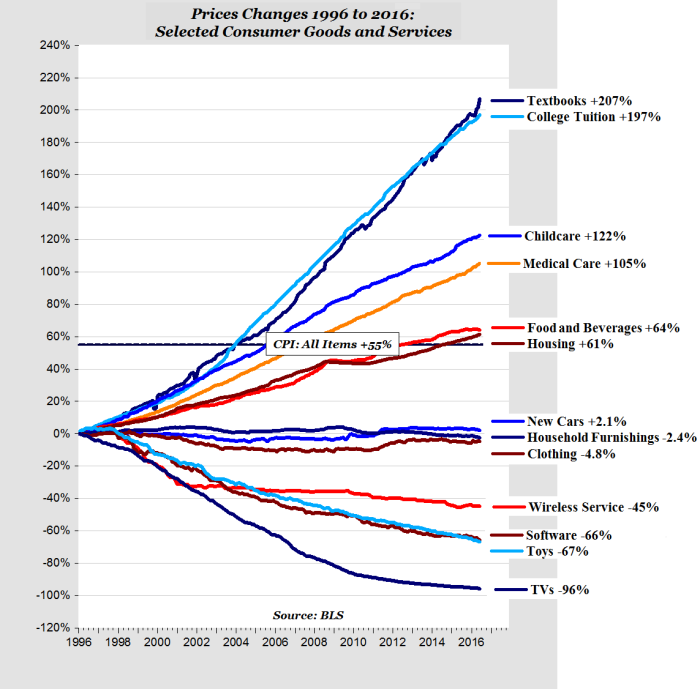I’m going to use this space today to write about something that I don’t often talk about, and that’s the fact that we are poor.
Our children qualify for Medicaid, which pays for their check-ups, vaccinations and dental care. They qualify for free breakfast at school and a reduced fee lunch. My youngest would qualify for WIC checks, which is a resource we’ve used in the past. We receive a federal subsidy under the Affordable Care Act, which helps my husband and I afford health insurance for ourselves.
We don’t think about often, because we don’t feel poor. We can pay our bills (most of the time). We have two cars that run (most of the time). We bought a house last year, with a little help from our families. I can even work part-time for a non-profit, because a relative helps out with childcare.
We are the Luckiest Kind of Poor People, the kind with wealthier family members who pass down furniture and appliances to us. We go to the beach every year because someone else pays for our lodging. We can afford to eat out now and then and maintain a couple of streaming subscriptions for entertainment. Life is pretty good.
We also don’t spend a lot of time talking about being poor, because, well, it’s embarrassing. There’s a stigma associated with being poor, the constant implication that you’re just not trying hard enough.
Americans have a long history of associated prosperity with virtue, which is why most us pretend to be more affluent then we actually are.
And there is certainly no end of people who will tell you that you just need to do X or give up Y, but the reality is that financial situations are complex and the path upward isn’t always straight.

This is the irony of the world we live in now: I have a device that can access the internet, make calls, stream TV, and instantly translate hundreds of languages, and this device fits in my pocket and I can buy one for less than the cost of a doctor’s appointment. Think about that for a moment.
So when social welfare issues hit the national spotlight, there’s this funny thing that happens where I look around and realize that this is just an “issue” for a lot of people. It’s an abstract concept that has no actual effect on their lives.
And a lot of them have been told, over and over again, that world is full of greedy, entitled poor people who are scamming the system, and the best way to stop that is not to fix social welfare programs, but to reduce funding for them.
 If the government cuts back the free and reduced lunch program so that fewer families are covered, that has a direct effect on our grocery budget every month. And as I said, we are the Luckiest Kind of Poor People. Our kids won’t go hungry. They might not eat as well and they won’t get milk every day, but they won’t go hungry.
If the government cuts back the free and reduced lunch program so that fewer families are covered, that has a direct effect on our grocery budget every month. And as I said, we are the Luckiest Kind of Poor People. Our kids won’t go hungry. They might not eat as well and they won’t get milk every day, but they won’t go hungry.
That’s not the case for every family.
Children have no control over their household income or stability. They have no control over the family budget. I can’t imagine what people think would be resolved or improved by letting children go hungry.
The larger, looming issue for us these days is health care. I’ve had a stomachache since November wondering what was going to happen to our health insurance, and the recent roll out of the health care plan proposed by the Republican party isn’t making me feel any better.
My husband and I have an “Obamacare” plan and have for a number of years. Neither one of us can get insurance from our employers, so the exchange was a perfect solution for us.
Over the past few years we’ve listened and sympathized with people who have been forced to change plans and faced rising premiums. I’ve listened to people complain about the subsidies they don’t qualify for and being forced to pay for services, like maternity or mental health, that they don’t use.
The American healthcare system in general is a lumbering, creaking Frankenstein monster. Obamacare was certainly not a complete solution, but that’s a topic for another day.
Obamacare works for us. Our current plan costs us $209 per month. That’s up $80 a month from last year, which I realize might sound like a very small increase to some of you. We had to cut things from our budget to be able to afford it.
It covers our routine medical costs with a minimal copay. It covers any testing that we need. It provides partial coverage for the medication I take for hypothyroidism.
Without the subsidies provided by the ACA, our plan would cost $674 per month. That’s more than our monthly grocery budget.
Even if we cut our coverage to bare-bones catastrophic, accepted a $5,000 deductible like we used to have and paid for all of our routine medical expenses out of pocket (and by that I mean never go to the doctor, borrow money or put it on a credit card, because there is no room in our budget for insurance AND routine medical costs) we would still struggle to afford $250 or $300 per month. It’s not a matter of cutting X or doing Y, the money just isn’t there.

And I just want to emphasize, that insurance is only covering the two of us. If our children ever get dropped from Medicaid, we’re up an entirely different kind of creek.
Like millions of Americans, we hope this time in our lives is temporary. We are trying hard. Where we are is not the bottom, it’s a place we scrambled up to.
My husband works full-time and goes to school at night so that someday he’ll be able to get a job with insurance benefits. We know that our kids won’t be little forever and there will be potential for me to work more hours without the expense of daycare.
We have hope for the future.
We hope that someday we won’t need help to pay for insurance. We hope that we’ll be able to pay for our children’s medical care. We hope to reach a place where we can actually put money in our savings account and not take it out two weeks later. We might even someday get to grumble about our taxes!

But for right now, this is where we are. And when you turn on the news and see people in nice suits talking about how people could afford health insurance if they just tried a little harder and cut back and little more, it makes me want to laugh. Not in a happy way.
Every social welfare program in this country has people who being served by it. Real people with real lives, not some mythical lazy stereotype. People who are disabled, people who live with chronic illness, people who were raised in poverty and never made it out.
To ignore us, or to insist that we’re victims of our own irresponsibility is not a solution. It’s a convenient excuse.